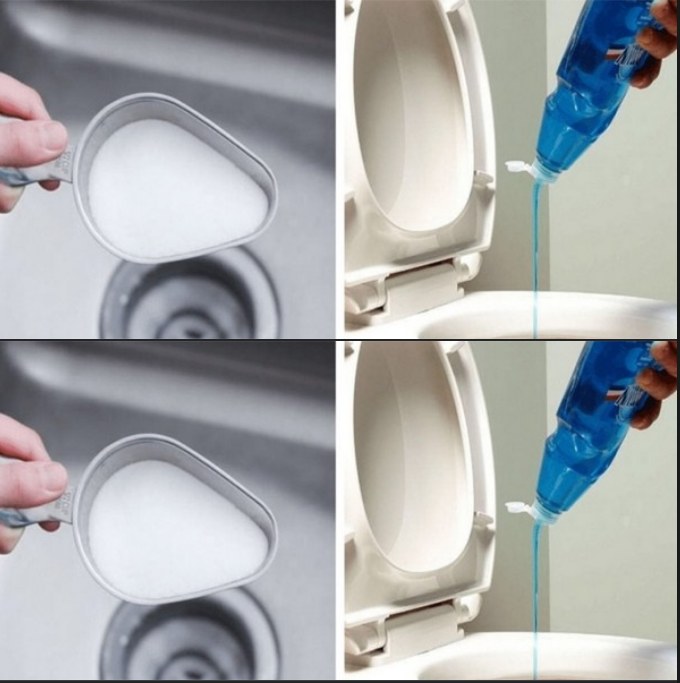ADVERTISEMENT
How to Do It:
- Mix ½ cup of baking soda and ½ cup of salt together.
- Pour the mixture down the clogged drain.
- Follow it with 1-2 cups of boiling water to help dissolve the mixture and break up the clog.
- Let the solution sit for about 15 minutes, and then flush with more boiling water.
This combination works best for clearing away food debris, grease, or organic material that might be causing a blockage in your pipes.
4. Plunger
A plunger is a classic tool for tackling blockages, and it’s an inexpensive, chemical-free option for clearing a variety of clogs. Using a plunger can create pressure to dislodge blockages in the pipes, especially if the clog is near the drain opening.
How to Do It:
- Ensure there’s enough water in the sink or tub to cover the bottom of the plunger’s cup.
- Place the plunger over the drain opening and make sure there’s a tight seal.
- Push down gently to create a vacuum, then pull up quickly to create suction. Repeat the process several times in short bursts.
- After a few minutes of plunging, check to see if the water starts draining. If it does, run some warm water to ensure the drain is completely clear.
A plunger is particularly effective for toilets, kitchen sinks, and bathroom sinks with moderate to severe clogs caused by hair, soap, or small debris.
5. Dish Soap and Hot Water
If your sink is clogged with grease or oil, dish soap combined with hot water can break down the fat and clear the blockage. Dish soap works by breaking up greasy substances, while the hot water helps flush them through the pipes.
How to Do It:
- Pour a generous amount of dish soap (about ¼ cup) down the clogged drain.
- Follow it with boiling water.
- Let the mixture sit for about 10-15 minutes to work through the grease and break up the clog.
- After waiting, rinse the drain with warm water to see if the clog is cleared.
This method is particularly useful in kitchen sinks, where grease and food particles are common culprits for blockages.
Additional Tips for Preventing Future Clogs:
- Use a Drain Catcher: Install a mesh drain catcher or strainer in your sinks and showers to catch hair, food, and debris before they go down the drain. This can significantly reduce the chances of clogs.
- Regular Maintenance: Periodically clean your drains with natural methods like baking soda and vinegar to prevent buildup. You can also run hot water through the pipes every week as a preventive measure.
- Avoid Pouring Grease Down the Sink: Always dispose of grease and oils in the trash rather than pouring them down the drain. These substances can solidify and cause major blockages.
Final Thoughts: Clear Drains Without Harsh Chemicals
Dealing with clogged sinks and pipes doesn’t have to involve harsh chemicals or expensive plumbing services. With these 5 natural and cost-effective methods—boiling water, baking soda and vinegar, salt and baking soda, plunging, and dish soap and hot water—you can clear minor to moderate blockages in no time.
Regular maintenance and prevention can help keep your drains free-flowing, so you don’t have to deal with clogs as often. These natural solutions are safe for your pipes, the environment, and your wallet, ensuring that your home stays clean and your plumbing stays in good working order.
ADVERTISEMENT
ADVERTISEMENT
